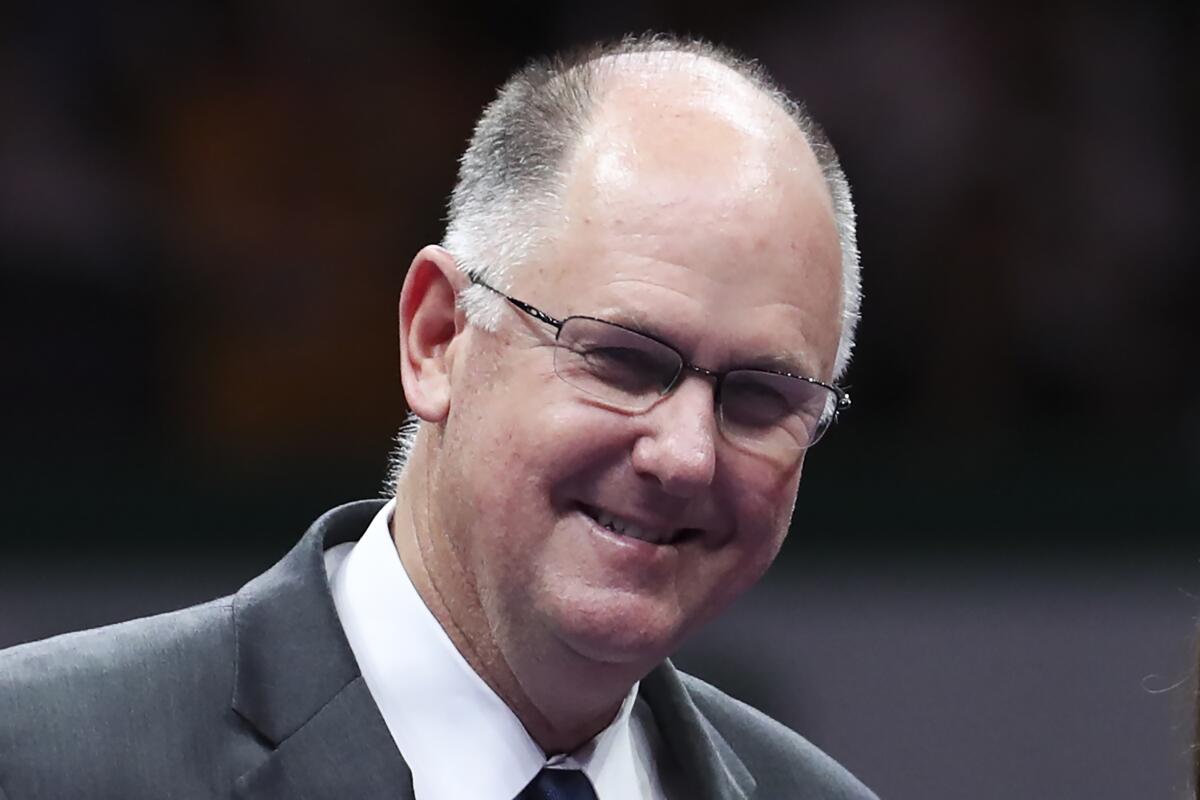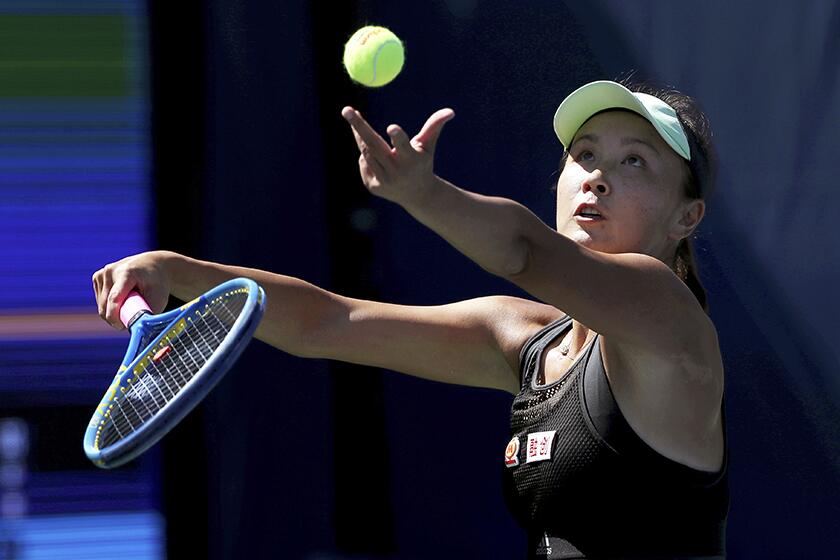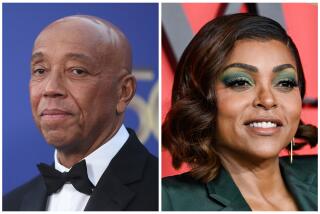Commentary: WTA chief Steve Simon shows unique resolve fighting to confirm Peng Shuai’s safety

- Share via
Steve Simon, a quiet man from Long Beach, has become a loud voice and role model for sports leadership. Given a chance to stand up for what is right, he did.
Simon, a former tennis player from Long Beach State and a former tournament director of what is now the BNP Paribas Open tennis tournament in Indian Wells, is the chief executive of the WTA, the women’s tennis tour. He doesn’t mince words. That’s because he doesn’t say many.
A month ago, one of his WTA players, China’s Peng Shuai, a popular player with two major doubles titles on her resume, posted an online accusation about being sexually assaulted a decade ago, and that continued off and on over at least a 10-year period, by a high-ranking official in the Chinese government. Her post quickly disappeared, and, for a while, so did she. Simon and the tennis world pressed for clarity. They got a stilted internet post in which she said she was OK and resting at home in Beijing. When that didn’t seem to appease tennis or friends, she gave an interview on video also that appeared rehearsed and contrived.
Women’s tennis takes a stand for Peng Shuai, a Chinese player who accused a Communist Party leader of sexual abuse and then vanished from public view.
Simon responded each time with furrowed-brow statements that questioned the legitimacy of what was going on. At first, he threatened to pull all women’s pro tennis events from China if he didn’t get satisfaction about Peng’s well-being. When he didn’t get that, he followed through on his threat, canceling all WTA events for 2022 in China. That could cost the WTA many millions of dollars.
This was no small move of a chess piece in the international game of standing up to China on human rights violations. Entire countries with huge armies and great financial and political leverage have tried and mostly failed. Simon has taken on China, and for once, a combination of money and the high profile of sports may bring success. Human rights violations are best dealt with through big headlines and lots of embarrassing noise. Sports can generate that.
A better perspective on what Simon has done shows up by comparing and contrasting. His peers, other sports commissioners, have had opportunities to take bold stances in sticky situations and mostly passed. Few of those situations reach as deeply into international relations and human rights as Simon has in the Peng case.
The NFL’s Roger Goodell has mastered the art of spinning and rationalizing. He punted the Colin Kaepernick case so often his toe must have hurt. And now, just recently, former NFL player Phillip Adams, who murdered six people before shooting himself to death, was found to have severe head injuries (CTE) that have become an epidemic in the league. Will Goodell ever really address this or just appoint another commission?
The NBA’s Adam Silver tap danced when a team executive backed Hong Kong in its resistance to Chinese domination. Left to dangle when the league, and his owner, issued separate statements distancing them from his opinion, the executive deleted his Tweet.

Major League Baseball’s Rob Manfred has yet to give us anything substantial about where the league stands on Trevor Bauer. Voicing the proper disgust and not hiding behind the specter of potential lawsuits would be a nice stroke of leadership.
Even golf, a few years ago, had a chance to throw back its shoulders and show the world it is interested in more than birdie putts and huge purses. A tournament in Saudi Arabia invited several of PGA Commissioner Jay Monahan’s big-name players to an event in which the prize money was large, and the appearance money — something not allowed on the PGA circuit — especially tempting. This was happening months after, by all reports, the Saudis had Washington Post journalist Jamal Khashoggi killed and dismembered in the Saudi consulate in Turkey. Khashoggi had written frequently about Saudi human rights violations.
Monahan heard the criticism and decided to let his players go anyway, saying his main concern was for their safety — apparently not how bad it looked to be hitting five irons and cashing big checks in a country governed by those who murdered Khashoggi.
Then there was the president of the International Olympic Committee, Thomas Bach of Germany, who held his own Zoom call with Peng. He never asked her about the sexual assault accusation and deemed her fine and happy afterward. Bach apparently likely felt he had to do that because the Winter Olympics begin in Beijing on Feb. 4 and human rights violations always put the Games on shaky ground. One more Peng Shaui and who knows?
The mysteries and significance of Peng Shuai’s temporary disappearance is roiling China
Simon did not dance, did not talk a lot and say nothing, did not remain silent in the face of a serious allegation. He took the most leverage he had — canceling sports events that China loves, in the cause of a player China loves. And he pulled the plug. His message was simple: Act like decent humans and we will come to your country. Don’t and we won’t.
President Biden has already signaled his feelings on the issue. The U.S. has other human rights issues besides Peng with China. Biden’s actions to cancel all U.S. diplomatic appearances during the Beijing Winter Games seemed to closely mirror Simon’s decisions. But his was a gesture. Simon’s was financial and substantive.
Simon may be the least likely U.S. sports executive to tackle something like this. His quiet nature has been his trademark for years, as he helped build the Indian Wells tournament into the grand event it has become. He was among those leading the way with electronic lines-calling on all courts — the first tournament anywhere to do that. When the attendance exceeded 400,000 and surpassed even the French Open one year, Simon was at the front of the bus. Serena Williams says that Simon, more than anyone else, talked her back to Indian Wells with his quiet, easy manner, after her 14-year boycott.
Through it all, he had the same answer to all inquiring reporters: “Just don’t write about me.”
J. Wayne Richmond, one of his best friends, his former boss at adidas marketing and the recently retired head of major events for U.S. Tennis, says of Simon, “He has no pulse. He cannot be flustered.”
Richmond also says, “He is the best friend in the world, and maybe the most boring dinner companion you’ll ever have.”
Which raises the question: Would you rather have charisma or guts?
Bill Dwyre is a former Los Angeles Times sports editor.
More to Read
Go beyond the scoreboard
Get the latest on L.A.'s teams in the daily Sports Report newsletter.
You may occasionally receive promotional content from the Los Angeles Times.








